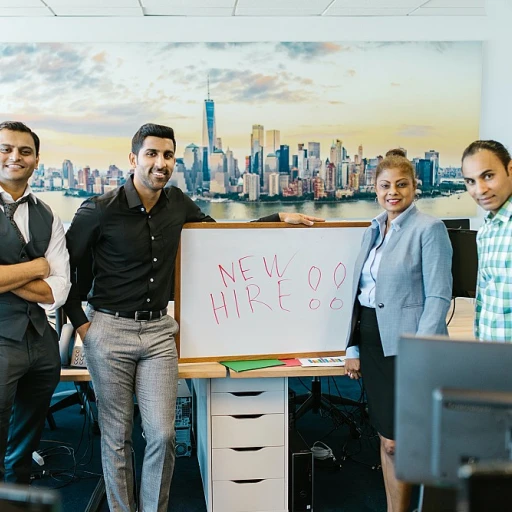Understanding Employer Branding
Defining the Heart of Employer Branding
The term employer branding might sound like just another buzzword, but it plays a pivotal role in how companies are perceived in the job market. At its core, employer branding involves promoting the company's unique culture, values, and work environment to attract and retain top talent. This isn't just about creating a logo or a catchy slogan; it's about embodying the company's identity and sharing it with the world. In today's competitive landscape, candidates gravitate towards companies that not only offer competitive salaries but also provide a workplace culture that aligns with their personal values. Building a solid employer brand can be a game changer in recruitment strategies, as it actively helps potential candidates envision themselves as part of the company. This alignment between the brand and job seekers creates a stronger candidate experience, ultimately making the recruitment process more efficient. Connecting with Your Audience A strong employer brand is one that resonates with both current employees and potential candidates. Companies need to showcase their workplace attributes through various channels, especially social media. By sharing stories, experiences, and showcasing company culture values, organizations can communicate their brand effectively. Utilizing digital platforms isn’t just about posting job ads. It's about engaging with audiences on a personal level and highlighting the employee experience. Social media platforms, for instance, allow companies to open a window into everyday life at work — celebrating successes, recognizing employees, and sharing values. These branding efforts can boost a company's reputation as a desirable place to work, creating an authentic image that attract the best talent. In summary, employer branding is much more than a superficial label; it's about capturing the essence of a company and conveying it in a way that speaks to employees and job seekers alike. As a vital part of the recruitment process, a strong employer brand cannot be overlooked. For a deeper understanding of how an HRIS can enhance these efforts, visit our blog on mastering the employee life cycle.The Role of Employer Branding in Attracting Talent
Embedding Employer Branding in Talent Attraction
In today's competitive job market, employer branding has become a game changer for companies striving to attract top talent. When a company successfully communicates its unique work culture, values, and employee experience, it positions itself as a desirable place to work, enticing potential candidates.
The recruitment process is now being heavily influenced by how companies showcase their company culture and values. Job seekers are increasingly using social media platforms to research and engage with potential employers. As such, companies with a strong employer brand capitalize on these interactions to create positive impressions with candidates.
Effective employer branding serves as a magnet, drawing in candidates who not only possess the required skills and experience but also align with the company's culture and values. This results in higher-quality applicants and reduces the time and resources spent on finding suitable candidates. By prioritizing cultural fit, organizations not only secure talent that meets their technical needs but also enrich the overall workplace culture.
For companies looking to optimize their talent acquisition strategies, integrating employer branding with their recruitment processes is essential. To enhance your recruitment efforts further, explore more about enhancing talent acquisition with HRIS, which offers additional insights and tools to refine your approach.
Building a Strong Employer Brand
Crafting an Inviting Workplace Image
Building a strong employer brand is not a one-time effort but a continuous process that necessitates a deep understanding of your company's unique culture values, and the attributes that distinguish it as a top place to work. A successful branding effort hinges on projecting an authentic and appealing company image to attract and retain top talent in a competitive job market.
First and foremost, companies must clearly define and communicate their core values and the work environment they foster. This transparency is critical not just for current employees but also for potential candidates who are evaluating whether their own values align with those of the company. A well-articulated set of company values lays a strong foundation for workplace culture and sets expectations for both the employer and the employee.
Secondly, businesses should focus on enhancing the candidate experience throughout the recruitment process. This involves being transparent about job roles, providing timely feedback, and ensuring the process is as smooth and seamless as possible. Positive interactions during the recruitment phase can position the company as an employer of choice for job seekers.
Connecting Through Digital Channels
Another essential component in building a robust employer brand is leveraging social media platforms. These tools can serve as powerful channels to showcase what makes your company a great place to work. By sharing stories, achievements, and behind-the-scenes glimpses into the work environment, companies create a relatable and appealing image that resonates with potential candidates.
Employers should capitalize on social media to celebrate cultural milestones, acknowledge employee successes, and highlight the diverse experiences within the company. This not only enhances the brand's visibility but also helps in weaving a narrative that can attract candidates eager to be part of a vibrant workplace.
For more in-depth insights into how top brands navigate these dynamics, check out the employee portal strategies that driven companies employ to cement their cultural standing and forge a strong employer brand.
Employer Branding and Employee Retention
The Link Between Employer Branding and Staff Retention
In a competitive job market, organizations are increasingly recognizing the vital connection between a strong employer brand and employee retention. This association is not merely anecdotal; numerous studies affirm that a well-established employer brand contributes significantly to reducing employee turnover rates. By strategically enhancing their workplace culture and clearly communicating company values, businesses can cultivate an environment where current employees feel valued and engaged. A strong employer brand communicates a company's culture and values effectively, attracting job seekers whose personal values align with those of the organization. This alignment is crucial to ensuring a positive candidate experience, ensuring that potential candidates are not only attracted by the opportunity but are also more likely to become committed employees in the long term.Building on Workplace Culture and Employee Engagement
Retaining top talent often hinges on the employer's ability to maintain a constructive and supportive work environment. Companies that prioritise strong workplace culture reinforce employee loyalty and satisfaction. This can be achieved through consistent feedback mechanisms, employee development opportunities, and fostering a culture that encourages open communication. When employees perceive their work environment as positive and aligned with their personal and professional growth, they are more likely to remain with the organization. This not only preserves talent but also minimizes the costs and disruptions associated with frequent recruitment processes.The Role of Employer Branding in Reducing Turnover
Employer branding efforts play a pivotal role in minimizing turnover by bridging the gap between the company’s external reputation and the internal employee experience. When employees feel connected to the brand and its mission, they become brand advocates both inside and outside of work. This creates an authentic narrative that resonates with potential candidates and enhances the overall candidate experience during the recruitment process. Social media and company reviews can amplify the impact of employer branding, as satisfied employees frequently share their positive experiences and workplace culture. Such endorsements in public forums serve as powerful testimonials that can sway potential employees and reinforce the brand’s credibility. In conclusion, robust employer branding not only attracts top talent but is a game changer for enhancing employee retention. Companies committed to fostering a reputable brand are better equipped to sustain a loyal and productive workforce.Leveraging Technology in Employer Branding
Innovative Tools for Employer Branding
In the digital age, tapping into technological advancements is a game changer for companies aiming to boost their employer branding efforts. Technology has transformed how a company can project its brand image and values to potential candidates. Here’s how companies can leverage technology to refine their employer branding strategies and stand out in the competitive job market.- Social Media Platforms: Social media is a critical tool for enhancing a company’s visibility. Platforms like LinkedIn, Instagram, and Twitter allow companies to showcase their workplace culture and highlight their company values. By sharing engaging content, such as employee testimonials and behind-the-scenes glimpses of the work environment, organizations can attract top talent who resonate with their brand ethos.
- Career Websites: A robust career web page can encapsulate everything a company stands for. This platform is vital for conveying the company's culture, values, and mission. Presenting current employee stories and experiences enriches the potential candidates’ perception, offering them a detailed candidate experience before they even apply for a job.
- Company Blogs and Vlogs: Regular content through blogs or vlogs can effectively communicate brand narratives. These tools allow companies to articulate their culture values and give insights into their recruitment process, further solidifying their reputation as a desirable place to work.
- Employee Advocacy Programs: Mobilizing current employees as brand ambassadors on social media amplifies the employer brand organically. Employees’ genuine experiences and voices often have a more substantial impact, enhancing authenticity and trust in the branding efforts.
- Interactive Job Portals: Utilizing job portals with integrated AI features can personalize the candidate experience. Tailored recommendations and interactive applications help streamline the recruitment process, ensuring that the job seekers have a positive and engaging interaction with the employer.
Measuring the Impact of Employer Branding
Evaluating the Success of Your Employer Branding Efforts
Measuring the impact of employer branding is crucial for refining strategies and achieving recruitment goals. It’s not just about attracting talent but ensuring that your branding efforts align with your company values and resonate with both current employees and potential candidates.
Key Metrics to Consider
To effectively measure the success of your employer branding, consider these key metrics:
- Candidate Experience: Analyze feedback from job seekers to understand their perceptions of your recruitment process. A positive candidate experience can be a game changer in attracting top talent.
- Employee Retention Rates: A strong employer brand should contribute to higher retention rates. Assess how your branding influences employee satisfaction and loyalty.
- Social Media Engagement: Track engagement on social media platforms where your company shares its culture and values. High engagement levels can indicate a strong connection with your audience.
- Quality of Hire: Evaluate the performance and cultural fit of new hires. A well-aligned employer brand should attract candidates who thrive in your work environment.
- Employer Brand Perception: Conduct surveys to gauge how your brand is perceived in the job market. This feedback can help refine your messaging and outreach strategies.
Continuous Improvement
Employer branding is not a one-time effort but a continuous process. Regularly review these metrics to identify areas for improvement. By leveraging technology and data analytics, companies can gain insights into their branding effectiveness and make informed decisions to enhance their recruitment strategies.
Ultimately, a strong employer brand not only attracts top talent but also fosters a positive workplace culture that supports long-term success. By understanding and measuring its impact, companies can ensure their employer branding remains a powerful tool in the competitive job market.











